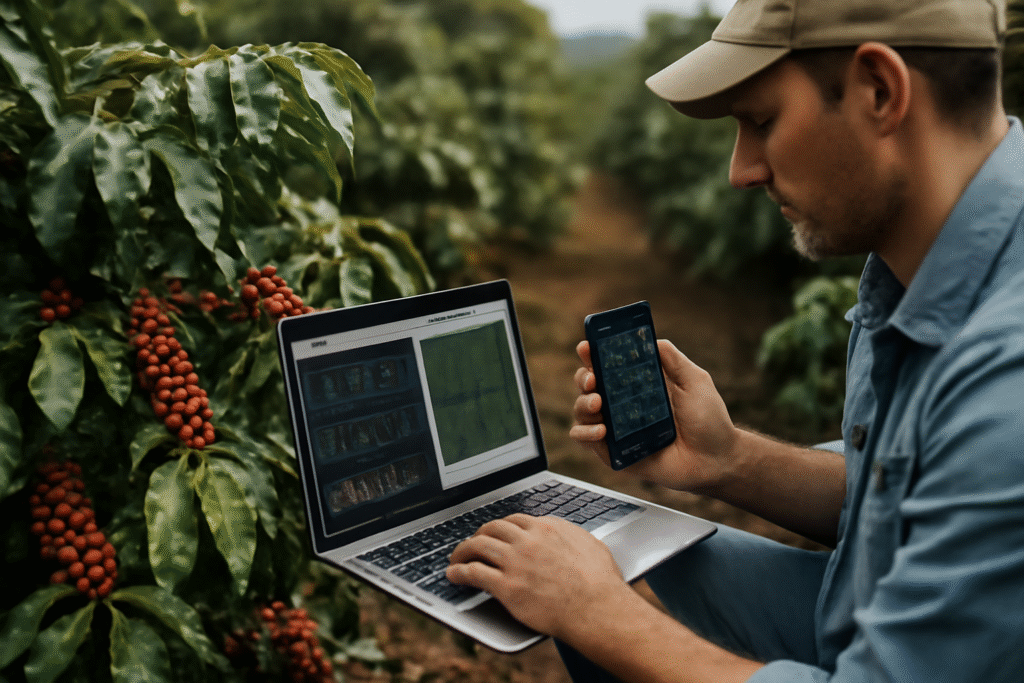From hand-picked cherries to artisan roasting, coffee may seem like a traditional, even old-fashioned craft. But behind the scenes, a quiet revolution is underway. Technology is transforming the way coffee is grown, processed, and delivered—ushering in a new era of precision, sustainability, and efficiency for producers around the world.
But what does this really mean for farmers, roasters, and coffee lovers? In this article, we’ll dive into the high-tech tools, smart farming techniques, and digital innovations that are reshaping coffee production—bean by bean, byte by byte.
What’s Driving Innovation in Coffee Farming?
Coffee faces major challenges: climate change, labor shortages, inconsistent yields, and volatile prices. To survive—and thrive—farmers are turning to agricultural technology (agritech) to improve productivity, quality, and resilience.
Innovation in coffee isn’t about robots replacing humans. It’s about empowering producers with better information, faster responses, and smarter decisions.
Precision Agriculture: Smarter Farms, Better Beans
One of the biggest game-changers in coffee production is precision agriculture—a data-driven approach to farming that helps growers understand exactly what their crops need, when they need it.
Some key tools include:
- Drones: Used to monitor crop health from the sky, identify pest outbreaks, and map terrain for better planning.
- Sensors in soil and weather stations: Track moisture, temperature, and nutrient levels in real time.
- Satellite imagery: Helps large farms analyze plant density, predict yields, and detect stress zones.
- Mobile apps and platforms: Allow farmers to log harvest data, receive alerts, and analyze performance.
With these tools, farmers can optimize irrigation, reduce pesticide use, and increase yield—all while lowering costs and environmental impact.
Coffee and AI: Artificial Intelligence on the Farm
AI isn’t just for Silicon Valley—it’s also for the coffee field. Startups and research centers are using artificial intelligence to help farmers and agronomists make faster, smarter decisions.
AI is being applied in:
- Pest and disease detection: Image recognition software can analyze leaf photos and diagnose problems in seconds.
- Yield prediction: Algorithms process years of data to forecast how much a farm will produce in a given season.
- Ripeness recognition: Smart harvesters or camera apps can identify which cherries are ready to be picked, improving quality.
- Processing optimization: AI models help processors fine-tune drying times and fermentation to enhance flavor.
These technologies can help even smallholder farmers access knowledge previously limited to scientists or industrial-scale operations.
Blockchain and Traceability: A Transparent Supply Chain
One of the biggest consumer demands today is transparency. People want to know where their coffee comes from, who grew it, and whether they were paid fairly.
Enter blockchain—a secure, digital ledger that tracks every stage of coffee’s journey, from the farm to the cup. With blockchain-powered platforms, each batch of coffee can be tagged with a digital ID that includes:
- Farmer and region of origin
- Processing details and dates
- Shipping and storage data
- Certifications (organic, fair trade, etc.)
This empowers consumers to make informed choices and helps producers and cooperatives build trust and access better-paying markets.
Coffee Roasting and Automation
Tech isn’t just transforming the farm—it’s also upgrading the roaster. Smart roasting machines now come equipped with software that tracks temperature, airflow, and bean color in real time. Roasters can:
- Create and repeat precise roast profiles
- Adjust parameters on the fly for consistent quality
- Store and share data for training and collaboration
There are even AI-powered roasters that learn from past batches and suggest tweaks to improve flavor balance.
For smaller roasteries, this means they can compete with industry giants while still highlighting the nuances of origin and variety.
Sustainability Through Innovation
One of the most promising aspects of coffee tech is its potential to support sustainable practices. With tools that optimize water usage, reduce chemical inputs, and prevent crop loss, technology is helping coffee producers reduce their environmental footprint.
Some innovations include:
- Water-saving fermentation systems
- Composting equipment for coffee pulp reuse
- Solar-powered dryers
- Climate-resilient varietal research aided by genetic mapping
At every level of production, new tools are helping make coffee more ethical, traceable, and environmentally responsible.
The Future of Coffee Is Connected
Imagine a coffee farm where weather forecasts are delivered by drone, ripeness is scanned with a smartphone, and fermentation is tracked with sensors and AI. That’s not science fiction—it’s already happening in Brazil, Colombia, Kenya, and beyond.
As more producers adopt these tools, the coffee industry is becoming more resilient to climate change, better informed, and more collaborative than ever before.
Final Thoughts: Tradition Meets Technology
Coffee’s future is not about abandoning its roots—it’s about enhancing them. By combining centuries-old farming wisdom with cutting-edge tools, the next generation of producers can grow coffee that’s not only better tasting, but also more sustainable and equitable.
Whether you’re a coffee grower, barista, or casual drinker, the digital transformation of coffee means we can all enjoy better quality, stronger connections, and a more transparent journey from bean to brew.
So the next time you sip a perfectly balanced cup, consider this—it might have been grown with help from satellites, AI, and a farmer who’s just as tech-savvy as your favorite app developer.
